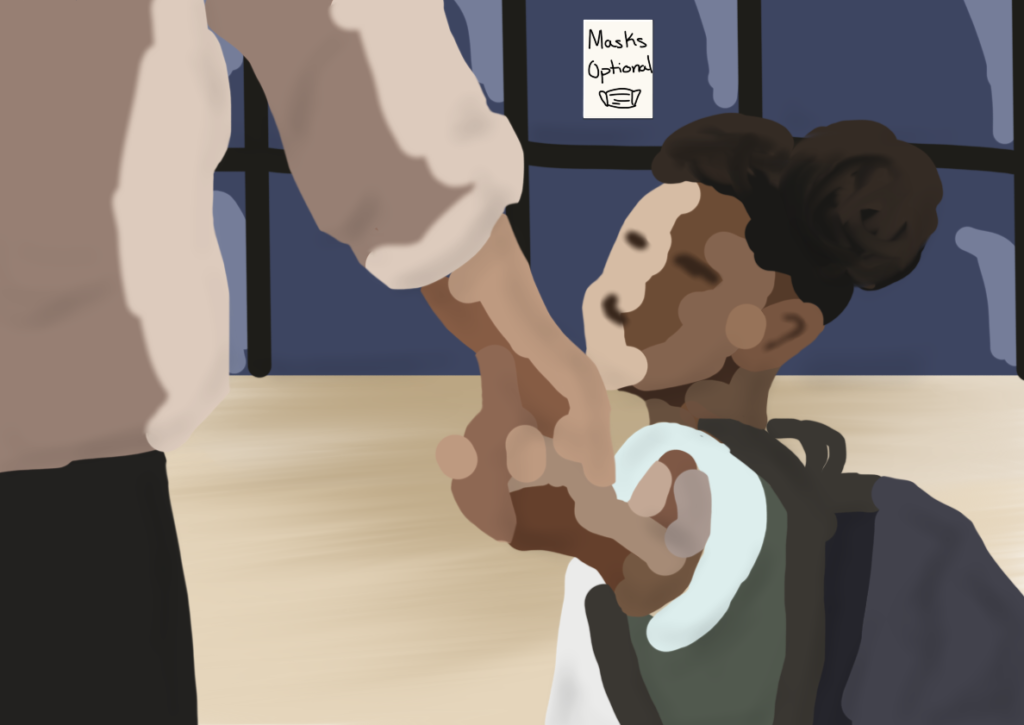
After the school board election results of Nov. 2, the Grinnell College community reflects on the importance of local politics. Graphic by Shabana Gupta.
With three challengers winning over the incumbent candidates, the Grinnell-Newburg School Board has undergone drastic turnover. Tyler Harter was elected as School Board chair and Chris Starrett and Roger Belcher were elected as Grinnell School Board’s newest at-large directors. Starrett and Belcher gained publicity for their positions against mask mandates and the Culturally Responsive Scorecard in Grinnell schools. The close results have reminded members of the College community how important their vote is.
Nat Jordan `21, co-chair of the campus Democrats, worked to encourage Grinnell students to vote in the days approaching November 2. He saw a clear distinction between the candidates running, and the possible implications that could have on the local community.
“Local politics are crucial,” he said, “and I think, unfortunately, a lot of students failed to realize that.”
Seeing that two of the challengers were running on only a couple of issues, like mask mandates and critical race theory, Jordan worries about their capability to effectively serve on a school board. These worries intensified after he watched the League of Women Voters forum with the candidates.
“I thought it was pretty concerning that there was a question asked about budgeting and they [Starret and Belcher] basically both said ‘oh I know nothing about budgeting,’” he said, “and that’s the number one job of a school board.”
The close margins of the election solidify Jordan’s stance that student involvement is more important than ever, with only 39 votes deciding a victory for Tyler Harter over Helen Redmond. Essentially, Grinnell students alone could have changed the results.
Going forward, Jordan hopes to continue to encourage students to vote in local elections, and deeply believes that students do have a role in shaping the Grinnell local community. He argues that Grinnell is a student’s home for four or five years and that professors and staff make decisions on where to work based on factors like local politics and quality of the school district.
He also hopes that the administration will play a larger role in making the voting process easier for students.
“There is a dearth of voting information on the [Grinnell College] website,” he said, “which is startling. If you look up basically any other peer institution, they will have voting information on their website.”
Ross Haenfler, beyond being the department chair of sociology, is a parent to a 3rd grader and 7th grader attending Grinnell local public schools. As such, he is directly affected by the outcome of the schoolboard elections.
While he does not think that there will be immediate radical changes within Grinnell schools as a result of the elections, he does fear for the way the new directors could affect how the School Board is conducted.
“It could make School Board meetings, which are typically non-partisan, more contentious,” he said.
Similar to Jordan, Haenfler also feels that the two-issue nature of these candidates could affect their actual ability to serve on a School Board.
“It [Starrett and Belcher’s victory] could embolden other challengers that I’m not sure have the best sense of what the School Board does in terms of budgets and oversights and are really just honing in on some of these hot-button cultural issues,” he said.
That being said, while he will continue to stay informed politically and financially contribute toward candidates that he supports, Haenfler also recognizes the importance of staying engaged with those he may not agree with. According to Haenfler, the issues that became hot button topics in the Grinnell election is part of a larger national pattern.
“I try to strike a balance between holding people in my community accountable, and at the same time knowing that its bigger than us,” he said. “This was a manifestation of a broader pattern: this sense of frustration and anger and backlash.”
Belcher and Starrett both did not respond to requests for comment on this article.